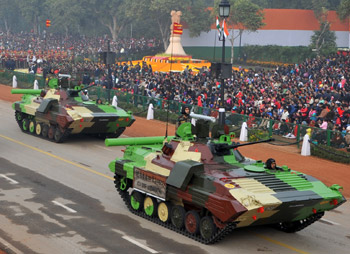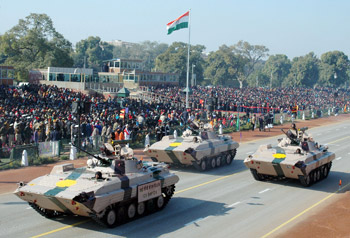INDIAN ARMED FORCES CHIEFS ON OUR RELENTLESS AND FOCUSED PUBLISHING EFFORTS

The insightful articles, inspiring narrations and analytical perspectives presented by the Editorial Team, establish an alluring connect with the reader. My compliments and best wishes to SP Guide Publications.

"Over the past 60 years, the growth of SP Guide Publications has mirrored the rising stature of Indian Navy. Its well-researched and informative magazines on Defence and Aerospace sector have served to shape an educated opinion of our military personnel, policy makers and the public alike. I wish SP's Publication team continued success, fair winds and following seas in all future endeavour!"

Since, its inception in 1964, SP Guide Publications has consistently demonstrated commitment to high-quality journalism in the aerospace and defence sectors, earning a well-deserved reputation as Asia's largest media house in this domain. I wish SP Guide Publications continued success in its pursuit of excellence.
Strategic partnership policy - Needs speedy conclusion
 |
By Lt. General P.C. Katoch (Retd) Former Director General of Information Systems, Indian Army |



When Defence Procurement Policy (DPP) 2016 was released by the then Defence Minister Manohar Parrikar in Defexpo 2016, it was without few appendices, which were added later. But the most important void was the chapter on Strategic Partnership (SP) which is vital for the 'Make in India' project to take off. It was then announced that the chapter on strategic partnership was to be deliberated upon and defined later. 15 months after the release of DPP 2016, there are indications that formulation of the strategic partnership may be reaching finalization. As per media reports, Defence Minister Arun Jaitley backed PMO, is pushing for setting up the private sector to play a major role in the production of weapons systems for the armed forces. Actually as a basic policy this did not require much research looking at countries like the US, Britain, Germany, Japan, South Korea etc where it is the private sector that is behind state-of-the-art defence products, China being the exception where anything and everything belongs to the state. In contrast, India has been nurturing the white elephant in the DRDO which has been the bane behind continuing imports of bulk of our defence needs. It may be recalled that at the time of release of DPP 2016, when private companies were looking up to bag multiple production offers including mega orders for aircraft, submarines, land systems (traditional stronghold of the public sector), disagreements within the government as to what should be the SP model, left them high and dry.
Top private sector representatives from industrial bodies were reportedly invited by the MoD on May 11 for discussions on the progress made with respect to the SP policy, and discussing possibility of taking up of four projects in first phase of the strategic partnership project - new submarines, naval utility helicopter, single-engine fighter aircraft for the IAF, and FICV for the Army. The irony all along has been that there is little concern about the mounting criticalities of the military and widening combat capacity gap vis-à-vis the PLA. To this end, the Defence Minister pushing for major role of the private sector in defence manufacturing is welcome step. However, reports are emerging we may again be going around in circles, with issues like grand-parenting and price discovery, on which there is no meeting ground. MoD is of the view that "at least" two strategic partners should be allowed in each segment so as to arrive at a "reasonable" price discovery otherwise it may lead to a monopolistic situation. Some of defence firms have said they will not support "open competition" in a particular program in which they already have the required competencies, for example for procurement of helicopters only companies with proven track record in producing helicopters be selected as strategic partners.
There are actually two ways to look at such objection: one, contention be agreed to which may help reduce selection time, and; two, in an open tender, firms with proven track record in producing particular item would automatically get preference, even extra point in selection process could be earmarked. Post meeting with stakeholders, a MoD release stated, and "The Ministry is working towards institutionalizing a transparent, objective and functional mechanism to encourage broader participation of the private sector in defence manufacturing under the Make in India framework." The Defence Acquisition Council (DAC) is slated to meet on May 15 to decide on the draft policy, but whether a final call will be taken during this meeting is anybody's guess. But the fact remains that keeping the decision in limbo adversely is affecting the defence of the country. In a country like ours, satisfying everyone is an impossible task especially where big money implies fierce competition. Under the proposed SP Model, one company would be selected for each area based on its competence, which would then tie up with the original foreign OEM selected through the procurement process, to build the platform in India with transfer of technology (ToT). While the finer points are to be discussed during the forthcoming DAC meeting on May 15, a disheartening news is media report quoting un-named officials, expressing confidence "that the policy can be finalized in the next few months".
Government needs to take final decision on issues like in the proposed SP Model since one company will be allowed to undertake only one strategic project and not qualify to compete for others, it is disadvantageous to companies like Tata and L&T that have been investing in multiple defence product fields. On the plus side while DPSUs have been treating their private sector counterparts as contractors, and private sector players have not been getting government support to get ToT from abroad, these issues are addressed in the proposed SP model, which is good. According to some sources, six major Indian companies will be able to qualify on financial grounds to be chosen for strategic partnership model; L&T, Tata, Mahindra & Mahindra, Reliance Defence, Bharat Forge and Adani Group. Since the SP policy aims to boost manufacturing of critical defence armaments by private sector, government must take a final decision without further delay. The fact that 15 months after release of DPP 2016 we have not yet arrived at the SP Policy despite the framework provided by the Dhiendra Singh Committee, is sad commentary. Concurrently, red-tape must be reduced as India still way behind in terms of ease of business. This should include a more liberalized FDI policy; either open up 100% FDI in defence or eliminate the red tape while considering 100% FDI on case-to-case basis.





